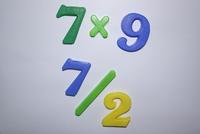Eleven plus maths hints
The good news is that the maths in any 11 plus paper will be based on the primary school curriculum; the bad news is that it will be at a significantly higher level: the 11 plus is taken at the beginning of Year 6, but some of the maths questions on the paper will pose a challenge to Year 7 and even Year 8 pupils at grammar school. Those of you who have been following my previous blog posts will know that one of the essential items in an eleven plus candidate's toolkit is a thorough knowledge of times tables up to 12 x 12, this will help with, among other topics, multiplication, division, factors, ratios, mean, median and mode, perimeter, area, square numbers and square roots. As well as ensuring that my tutees know their times tables, I also do other mental arithmetic exercises such as taking a number and doubling it as many times as they can; I also test my tutees on halving numbers in the same way.
Many children struggle with the topic of fractions, an important topic as there is a range types of fraction question such as fractions of a whole number, equivalent fractions, simplifying fractions, adding fractions and multiplying fractions. If you are trying to help your child with fractions, remember there are many ways of helping them to understand fraction problems. My favourite is to say that the numerator (top number) is the number of cakes and the bottom number (denominator) is the number of people who are going to share the cakes, so 5/2 is five cakes shared by two people so each person would get 21/2 cakes. Don't laugh, this does actually work! Another technique is to say that the denominator tells us how big the piece of pizza is and the numerator tells us how many pieces of pizza there are - food analogies always go down well although we do sometimes get sidetracked into discussing which toppings we would like to have on our pizzas! I'm sure Mr Fry, my maths teacher at Sir Joseph Williamson's Mathematical School (originally set up to teach navigation to sailors, but it then became a standard state grammar school so we did study other topics apart from maths!) would be proud of me now as his favourite saying was "Maths is fun!"
One topic that children often find difficult is word problems, for example: "a train leaves a station at 14:45 and arrives at 16:23, how long does the journey take?" or "a jacket costing £120 is reduced in price by 1/3. What is the new price of the jacket?" These questions are more difficult than questions such as "what is 2/3 of 120?" because there are additional steps of reasoning involved in solving the problem although the arithmetic skills involved are not high level.
In summary, ensure your child has a thorough knowledge of the basics and then make sure they have lots of practice on word problems.



Comments